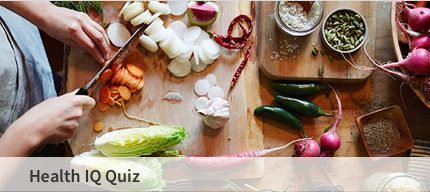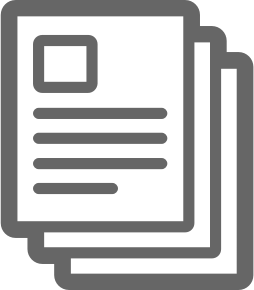
 Health Literacy & Diabetes
Health Literacy & Diabetes
According to a 2002 study in JAMA, patients with low health literacy are 43% less likely than patients with higher health literacy to achieve tight glycemic control and are also 203% more likely to have poor glycemic control.
Health literacy is a measure of patients' ability to read, comprehend, and act on medical instructions. Poor health literacy is common among racial and ethnic minorities, elderly persons, and patients with chronic conditions, particularly in public-sector settings. Little is known about the extent to which health literacy affects clinical health outcomes. The objective of this study was to examine the association between health literacy and diabetes outcomes among patients with type 2 diabetes. After adjusting for patients' sociodemographic characteristics, depressive symptoms, social support, treatment regimen, and years with diabetes, patients with low health literacy were 43% less likely than patients with higher health literacy to achieve tight glycemic control and were 203% more likely to have poor glycemic control.
Schillinger D et al. JAMA. 2002 Jul 24-31;288(4):475-82.
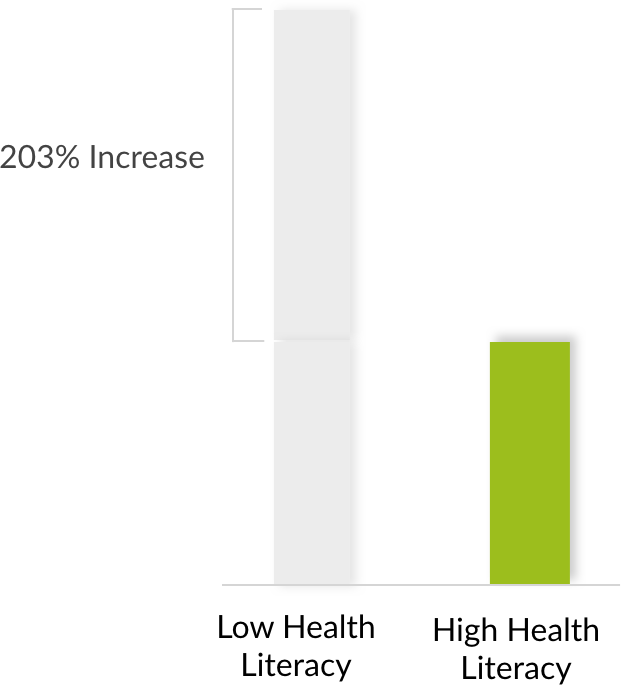
Health Literacy & Diabetes
According to a 2002 study in JAMA, patients with low health literacy are 43% less likely than patients with higher health literacy to achieve tight glycemic control and are also 203% more likely to have poor glycemic control.
Health literacy is a measure of patients' ability to read, comprehend, and act on medical instructions. Poor health literacy is common among racial and ethnic minorities, elderly persons, and patients with chronic conditions, particularly in public-sector settings. Little is known about the extent to which health literacy affects clinical health outcomes. The objective of this study was to examine the association between health literacy and diabetes outcomes among patients with type 2 diabetes. After adjusting for patients' sociodemographic characteristics, depressive symptoms, social support, treatment regimen, and years with diabetes, patients with low health literacy were 43% less likely than patients with higher health literacy to achieve tight glycemic control and were 203% more likely to have poor glycemic control.
Schillinger D et al. JAMA. 2002 Jul 24-31;288(4):475-82.
 Health Literacy & Hospitalizations
Health Literacy & Hospitalizations
According to a 1998 study in the Journal of General Internal Medicine, patients with low health literacy are 69% more likely to be hospitalized. If hospitalized in the last year, the probability increases to 315%.
The objective of this study was to determine the association between patient health literacy and hospitalization. A total of 979 patients participated in the Literacy in Health Care study. Of these, 958 (97.8%) had electronic medical records available. After adjusting for age, gender, race, self-reported health, socioeconomic status, and health insurance, patients with low health literacy are 69% more likely to be hospitalized.
Baker DW et al. J Gen Intern Med. 1998 Dec;13(12):791-8.
Health Literacy & Hospitalizations
 Health Literacy & Sugar Intake
Health Literacy & Sugar Intake
According to a 2014 study in the Journal of the Academy of Nutrition and Dietetics, people who know that sugar-sweetened beverages contribute to weight gain are 61% less likely to consume these beverages on a daily basis.
Because there is limited information on associations between health-related knowledge and sugar-sweetened beverage (SSB) intake, this cross-sectional study examined this question using the 2010 HealthStyles Survey data for 3,926 adults. After controlling for age, sex, race/ethnicity, education level, annual household income, and geographic region, the odds for drinking SSBs over 2 times per day were significantly higher among adults who did not agree that drinking SSBs can contribute to weight gain. The finding that knowledge about the adverse effects of SSB intake is significantly associated with SSB intake among adults suggests that health education regarding the potential contribution of excess energy intake from SSBs to weight gain could contribute to lowered consumption and lower rates of obesity.
Park s. Et al. J Acad Nutr Diet. 2014 Jul;114(7):1059-66. doi: 10.1016/j.jand.2013.11.003. Epub 2013 Dec 19.
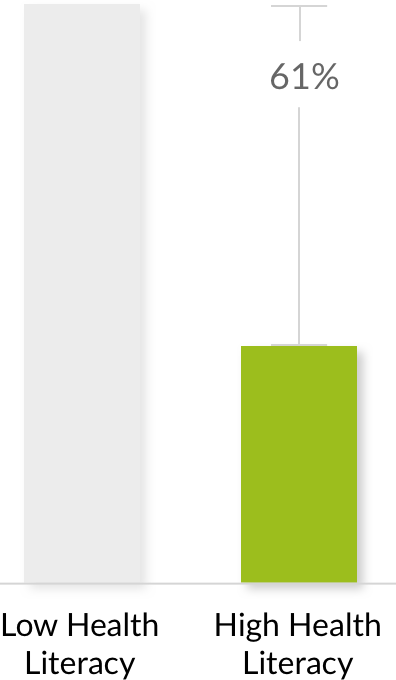
Health Literacy & Sugar Intake
According to a 2014 study in the Journal of the Academy of Nutrition and Dietetics, people who know that sugar-sweetened beverages contribute to weight gain are 61% less likely to consume these beverages on a daily basis.
Because there is limited information on associations between health-related knowledge and sugar-sweetened beverage (SSB) intake, this cross-sectional study examined this question using the 2010 HealthStyles Survey data for 3,926 adults. After controlling for age, sex, race/ethnicity, education level, annual household income, and geographic region, the odds for drinking SSBs over 2 times per day were significantly higher among adults who did not agree that drinking SSBs can contribute to weight gain. The finding that knowledge about the adverse effects of SSB intake is significantly associated with SSB intake among adults suggests that health education regarding the potential contribution of excess energy intake from SSBs to weight gain could contribute to lowered consumption and lower rates of obesity.
Park s. Et al. J Acad Nutr Diet. 2014 Jul;114(7):1059-66. doi: 10.1016/j.jand.2013.11.003. Epub 2013 Dec 19.
 Health Literacy & Mortality
Health Literacy & Mortality
According to a 2016 study by Health IQ analyzing the health knowledge of over 1 million people, a well-rounded foundation of health knowledge is correlated to a significant reduction in mortality risk for adults from ages 30-89. High Health IQ men had 33% lower mortality than low Health IQ men and for women the difference was 47%. Overall, those with high Health IQ have 41% lower mortality.
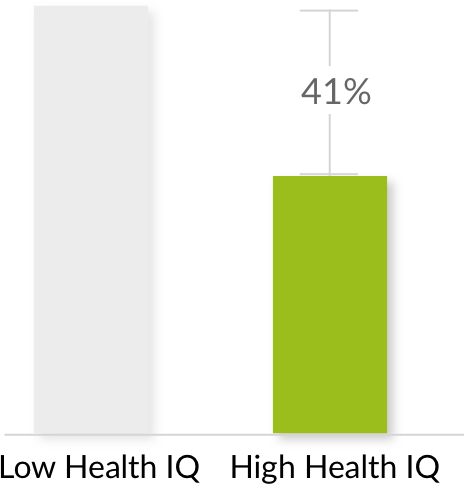
Health Literacy & Mortality


We are a licensed life insurance agent* in all 50 states.
View our licenses
We negotiated lower rates on life insurance using science and data.
View our research
By health conscious people for health conscious people. Our team is comprised of health conscious people who overcame their own health challenges with healthy habits, exercise, and nutrition.
Meet our team










